JAPANESE SWORDSWOMEN VI:
WANDERING BUTTERFLY OF THE GINZA
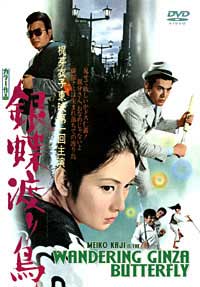 There's no doubt but that Meiko Kaji is the epitome of coolness & beauty. Yet one critic called her the "Queen of Garbage" thanks to films even worse than the two Wandering Ginza Butterfly films.
There's no doubt but that Meiko Kaji is the epitome of coolness & beauty. Yet one critic called her the "Queen of Garbage" thanks to films even worse than the two Wandering Ginza Butterfly films.
She's great whether it's her voice on the soundtrack singing the theme song "Wandering Silver Butterfly," or her character taking a "yakuza greeting" stance (half kneeling with right hand held outward), introducing herself: "They call me Nami the Crimson Cherry Blossom. I am a homeless wanderer."
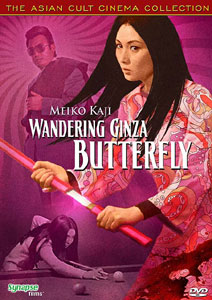 It's only too bad that Wandering Ginza Butterfly (Gincho wataridori, 1971) isn't worthy of this great beauty's talents. It's only too bad that Wandering Ginza Butterfly (Gincho wataridori, 1971) isn't worthy of this great beauty's talents.
The support cast of modern gangsters come across as nurdy, unsexy, or absurd. Though one or two characters improve as the story progresses, there's simply no male player the equal of a Ken Takakura or Koji Tsuruta who made the yakuza films of the previous decade so awesome.
Kaji Meiko has to carry this film all by herself, & despite that her beauty & charisma are strong stuff, the script is simply too awful for her to save it.
Nami gets out of prison early, serving a short time after murdering a gangster. The wife of the man she killed had petitioned for a reduced sentence, & Nami feels she must somehow pay the woman back. She gets a job as a club hostess on the Ginza, which is dangerously close to working as a prostitute.
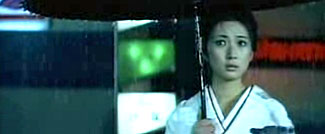 There's not much of a story here, & what little story exists is rather muddled, so it takes a lot of hard work to figure out anything about Nami. There's not much of a story here, & what little story exists is rather muddled, so it takes a lot of hard work to figure out anything about Nami.
We get to see her very, very briefly with hanafuda cards gambling in order to help her seedy friend Kyoko, but she merely wins without incident. Unlike most yakuza films, gambling doesn't occur that much. So the focus really is club hostessing, which is frankly boring stuff.
A yakuza film that leaves out all the regular content might have been a good excuse to tell a different sort of story. But whoever decided having a tough beauty be nothin' but a wussy hostess would be just the thing just wasn't thinking.
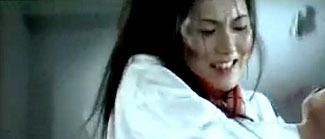 We don't get to see her doing much of squat that has any intrigue or interest until the "big" duel of billiards, without even much of a foreshadowing that she might be all that good at billiards. We don't get to see her doing much of squat that has any intrigue or interest until the "big" duel of billiards, without even much of a foreshadowing that she might be all that good at billiards.
In retrospect there were a couple clues, but in the main it seems to come from out of left field. Watching her playing pool against the bad yakuza boss's best player (Koji Nambara) isn't filmed well enough to convince anyone either the actress or the actor actually could play well.
We get phony quick editing of balls bouncing around instead of expert shots. And that resulted in an effect far short of drama.
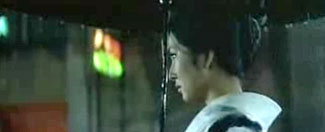 She wins but Owada the evil gambling boss won't honor his losses. So the tepid hero Shin intervenes with a heroic threat -- of legal proceedings. She wins but Owada the evil gambling boss won't honor his losses. So the tepid hero Shin intervenes with a heroic threat -- of legal proceedings.
Shin gets shot dead in a drive-by & won't be missed by the viewers, though it's does provide an excuse for having Nami at long last actually do something about all the scoundrels.
She has been dressing like a modern gal but for her yakuza raid on the evil boss's headquarters she puts on her best kimono so she'll look cool marching with umbrella in the rain, meeting her semi-boyfriend Ryuji (Tsunehiko Watase) along the way.
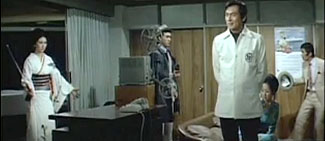 Just as we had only the slightest forewarning that she was good at hitting pool balls, we likewise have not been shown beforehand that she can fight, save only that heroines in this sort of film usually can. Just as we had only the slightest forewarning that she was good at hitting pool balls, we likewise have not been shown beforehand that she can fight, save only that heroines in this sort of film usually can.
She shows up at Owada's headquarters with a sword, Ryuji with a gun. That final-reel display of sword skill is fun because, hey, Kaji Meiko is cutting men to ribbons, & getting splatters of tomato juice on her lovely kimono. but was that enough to save an otherwise dull film? The answer is either "Not especially" or "I guess so." Watch it yourself & you choose.
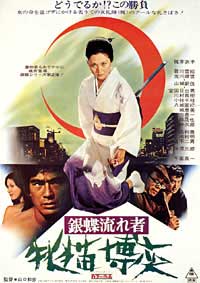 Junko Fuji, the greatest of all lady-gambler film stars, had recently retired from the industry at a time when Japanese cinema was in decline. Several studio product directors tried to fill the vaccuum. Junko Fuji, the greatest of all lady-gambler film stars, had recently retired from the industry at a time when Japanese cinema was in decline. Several studio product directors tried to fill the vaccuum.
Wandering Ginza Butterfly was one of those hasty projects intended as the first of a series of films that would take up the commercial slack left by Junko no longer appearing in new episodes of the Red Peony Gambler. If anyone could equal Junko, it would've been Kaji Meiko, if she weren't stuffed in such bad scripts as that first episode.
It would appear the producers felt the same way. Someone must've looked at that billards "duel" of the first film & said, "Holy Jizo-sama, who thought that was a good idea?" & suggested that things had better get a lot more interesting if the series were to continue.
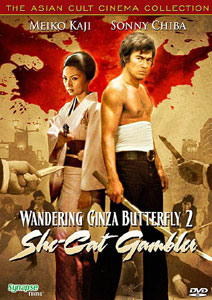 For the same reasons, that dolt who played Ryuji had to go. Sure, he was supposed to be a dufus, but he had to have charisma to boot. For the same reasons, that dolt who played Ryuji had to go. Sure, he was supposed to be a dufus, but he had to have charisma to boot.
So they got the internationally adored Shinichi "Sonny" Chiba, great at clowning & still capable of having a sexy impact on a story, to take over the role This would be a big plus throughout the second film, especially for the climactic battle with Shinichi & Kaji doubling the charismatic on-screen action.
In Part I, her late father seems to have been remembered as a bit of a pool shark. But this second time around, he's overtly shown in flashbacks to have been an honest gambling-hall dealer who was set up & murdered by Hoshiden, a repulsive scammer who, thirteen years later, has changed identies & become "president" of Aiboshi Industries, a front-company for gambling & prostitution ring on the Ginza.
This time, in Wandering Ginza Butterfly: The Wildcat Gambler (Gincho nagaremono mesuneko bakuchi, 1971), Nami the Crimson Cherry Blossom wears superb kimonos instead of hip chick fetish gear, & she's expert with hanafuda cards & dice. So she's much more obviously the Junko Fuji chivalrous woman gambler sort, no more of that wussy club hostess B-S. It's still no classic but it's worlds above the first Silver Butterfly film.
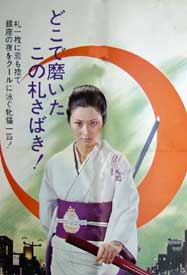 Monjiro of Ikaho, a skillful gambler not above cheating with a double-card. Monjiro of Ikaho, a skillful gambler not above cheating with a double-card.
He is caught doing so when she gambled for a young woman's indenture contract to the prostitution ring. Far from being angry with Nami, he's deeply ashamed, as he would like to have been worth her respect.
Hanae, the girl Nami liberated, is soonafter hunted by the gang that had lost any right to claim her. Her father, a drunkard who sold her into prostitution, is full of guilt & misery, though unable to mend his ways.
The gambling club run by Ryuji Azuma (Sonny Chiba) will no longer let the old man drink or gamble because of his having sold his own daughter for gambling funds. Known as Senza of the Double Card, the old drunk had once been famous among gamblers, but booze had destroyed him. He just gets pitifuller & pitifuller.
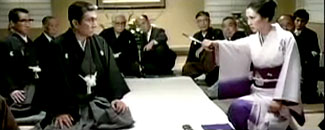 Nami the Silver Butterfly arrives in the Ginza in Tokyo looking for her father's killer. Nami the Silver Butterfly arrives in the Ginza in Tokyo looking for her father's killer.
She meets with the creepy oyabun Aiboshi, who immediately wants to hire such a beauty as a dealer for his gambling hall. She tells him, "I'm a flying bird that migrates from one place to another" & refuses to be hired as his dealer.
The "good" yakuza Ryoji is essentially a pimp. Girls would rather work for him than for the big yakuza gang, which abuses women, whereas Ryoji sees it as his duty to protect the working girls. This makes Aiboshi livid; he wants Ryoji dead.
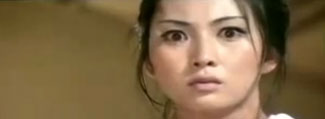 Other plot-threads include Nami's friendship of several years with the woman gambler Miyoko, into whose care Nami places the freed Hanae. Other plot-threads include Nami's friendship of several years with the woman gambler Miyoko, into whose care Nami places the freed Hanae.
Miyoko has become totally corrupted & untrustworthy as a friend, but redeems herself eventually.
Then there's Monjiro the Chili Pepper who has come to think of himself as Nami's disciple. He arrives in the Ginza to help her, stays at Ryoji's gambling den at Nami's request to Ryoji, but is soon & sadly martyred.
 Nami eventually figures out that Aiboshi is the same as Hoshinden, her father's killer. Nami eventually figures out that Aiboshi is the same as Hoshinden, her father's killer.
She's also learned Aiboshi is selling girls on the sexual slave market outside of Japan, which is why he's so eager to get his hands on Hanae.
Killing her pal Monjiro appears to have been the last straw. Her tanto knife fight at the end is super. She's joined by Ryuji who tosses her a gun while he swings his katana. When she's out of bullets, she grabs a katana too.
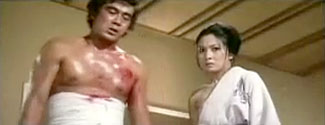 It's a great & bloody climax, with Meiko & Shinichi a kind of Beauty & the Beast harvesting bad guys as though they were stems of rice. It's a great & bloody climax, with Meiko & Shinichi a kind of Beauty & the Beast harvesting bad guys as though they were stems of rice.
But an effective finale doesn't save the whole film. This second of the intended series is an improvement over the first, & pretty good whenever Meiko's on the screen, but weakens when the camera is not on her. Even with obvious attempts to improve it as a series, it was rightly aborted with this installment.
copyright © by Paghat the Ratgirl
|
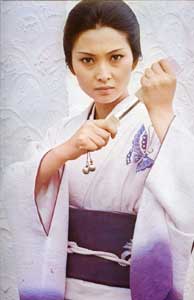

 It's only too bad that Wandering Ginza Butterfly (Gincho wataridori, 1971) isn't worthy of this great beauty's talents.
It's only too bad that Wandering Ginza Butterfly (Gincho wataridori, 1971) isn't worthy of this great beauty's talents. There's not much of a story here, & what little story exists is rather muddled, so it takes a lot of hard work to figure out anything about Nami.
There's not much of a story here, & what little story exists is rather muddled, so it takes a lot of hard work to figure out anything about Nami. We don't get to see her doing much of squat that has any intrigue or interest until the "big" duel of billiards, without even much of a foreshadowing that she might be all that good at billiards.
We don't get to see her doing much of squat that has any intrigue or interest until the "big" duel of billiards, without even much of a foreshadowing that she might be all that good at billiards. She wins but Owada the evil gambling boss won't honor his losses. So the tepid hero Shin intervenes with a heroic threat -- of legal proceedings.
She wins but Owada the evil gambling boss won't honor his losses. So the tepid hero Shin intervenes with a heroic threat -- of legal proceedings. Just as we had only the slightest forewarning that she was good at hitting pool balls, we likewise have not been shown beforehand that she can fight, save only that heroines in this sort of film usually can.
Just as we had only the slightest forewarning that she was good at hitting pool balls, we likewise have not been shown beforehand that she can fight, save only that heroines in this sort of film usually can.
 For the same reasons, that dolt who played Ryuji had to go. Sure, he was supposed to be a dufus, but he had to have charisma to boot.
For the same reasons, that dolt who played Ryuji had to go. Sure, he was supposed to be a dufus, but he had to have charisma to boot.
 Nami the Silver Butterfly arrives in the Ginza in Tokyo looking for her father's killer.
Nami the Silver Butterfly arrives in the Ginza in Tokyo looking for her father's killer. Other plot-threads include Nami's friendship of several years with the woman gambler Miyoko, into whose care Nami places the freed Hanae.
Other plot-threads include Nami's friendship of several years with the woman gambler Miyoko, into whose care Nami places the freed Hanae. Nami eventually figures out that Aiboshi is the same as Hoshinden, her father's killer.
Nami eventually figures out that Aiboshi is the same as Hoshinden, her father's killer. It's a great & bloody climax, with Meiko & Shinichi a kind of Beauty & the Beast harvesting bad guys as though they were stems of rice.
It's a great & bloody climax, with Meiko & Shinichi a kind of Beauty & the Beast harvesting bad guys as though they were stems of rice.